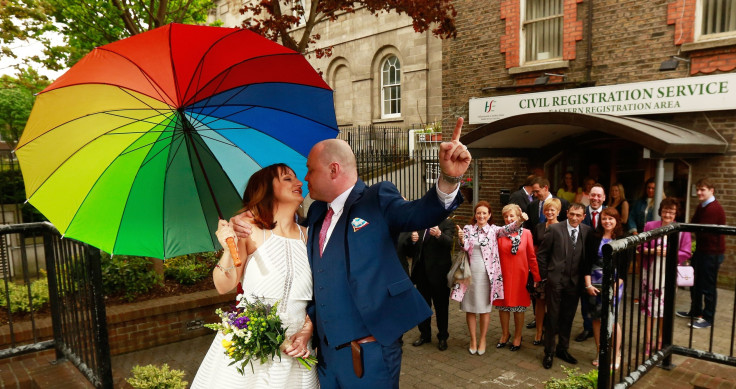Ireland Gay Marriage Vote Count Begins, Victory For 'Yes' Expected

This story has been updated.
UPDATE, 2:15 p.m. EDT:Ireland officially became the first country in the world to legalize same-sex marriage by popular vote Saturday, overwhelmingly passing the referendum. With all votes counted, the returning officer, Ríona Ní Fhlanghaile, declared that the referendum passed by almost half a million votes, 1,201,607 votes to 734,300. That’s 62.1 percent of voters saying yes and 37.9 percent voting no. The total turnout was 60.5 percent.
UPDATE, 1:45 p.m. EDT:Ballots have been counted from 34 of the 43 voting areas in Ireland and the referendum to legalize same-sex marriage is passing by a margin of almost two to one in the areas, the New York Times reported. All but one of the districts counted have voted yes, making it all but impossible for opposition votes to sway the poll.
Same-sex couples and gay rights supporters waved rainbow flags and celebrated in Central Dublin embracing and crying, as the official results in the courtyard of Dublin Castle rolled in, according to Reuters. The vote brought out one of the highest turnouts in a referendum in decades.
Original story below.
The counting of votes in Ireland’s historic referendum on same-sex marriages began Saturday and early estimates indicate its acceptance with a resounding victory. In a rare public vote, over 3.2 million people were eligible to decide whether they wanted to amend the country's constitution to allow the marriage of gay and lesbian couples.
Although official results are not expected to be announced before 3:00 p.m., local time, (10 a.m. EDT), a leading campaigner for the “No” side accepted defeat. Two government officials also said that they felt confident about a win for the “Yes” side, while some of the campaigners were seen celebrating victory, Agence France-Presse reported.
The Irish Independent reported that the final count from the country's largest city is overwhelmingly in favor of the referendum, with 72 percent of voters in favor.
Final tally for Dublin Central: 72% #YesVote (23,078) - 28% NO(8,890) #MarRef #TallyTweets
— Independent.ie (@Independent_ie) May 23, 2015With the referendum, the largely Catholic country would become the world’s first country to make the change after a popular vote. Homosexuality was illegal in Ireland until 1993, while abortion still remains prohibited, unless the mother’s life is in danger.
"I'm calling it. Key boxes opened. It's a yes. And a landslide across Dublin. And I'm so proud to be Irish today," Minister for Equality Aodhan O. Riordain, said on Twitter.
David Quinn of the Iona Institute, a Catholic group, said that it was "obviously a very impressive victory for the 'yes' side,” BBC reported, citing national broadcaster RTE.
"It was always going to be an uphill battle - there were far fewer organisations on the 'no' side, while all the major political parties were lined up on the 'yes' side and you had major corporations coming out for the first time to say how we should vote on a particular issue," Quinn said.
Minister for Health Leo Varadkar, who had recently come out as Ireland’s first openly gay minister, described the expected “Yes” vote as a historic day for the country, according to the Irish Times. “I wanted to be an equal citizen in my own country and today I am,” he said.
Niamh Fitzgerald, one of the voters, said, according to AFP: "This is only the beginning of a much bigger thing. Everybody has a right to a religion but no one religion has the right to dictate to a country what our rights should be."
She added: "It's probably going to be the first election where the Catholic Church's power is waning. It is showing a real shift."
© Copyright IBTimes 2025. All rights reserved.






















